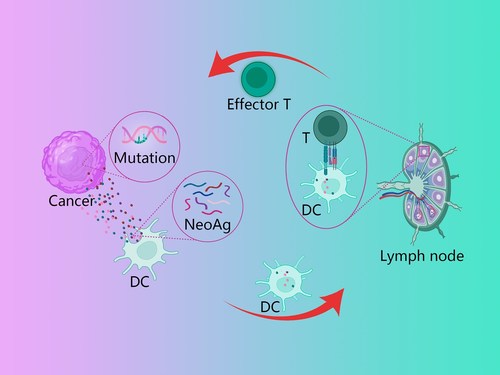Chinese Medical Journal Review Highlights the Effectiveness of Neoantigens Against Cancer
15 Dec 2022
Immunotherapy
Targeting neoantigens increases the precision of immunotherapy-based cancer treatment
BEIJING, Dec. 15, 2022 /PRNewswire/ -- In recent years, cancer treatment has seen significant progress owing to the advent of immunotherapy. However, immunotherapy comes with its share of challenges, such as the inability to target all cancer types with precision, and associated adverse effects. Now, researchers may have found a ray of hope in the form of neoantigens—abnormal peptides expressed by malignant tumor cells. With emerging high-throughput technologies, it is now possible to identify neoantigens with higher accuracy. Moreover, neoantigen-targeting immunotherapies have exhibited safety and efficacy in clinical trials.
Continue Reading

Preview
Source: PRNewswire
Neo-antigen-based precision cancer immunotherapy
This warrants a deeper understanding of neoantigens' potential as targets of immunotherapies in the future. With this in mind, a research team led by Dr. Bo Zhu from Army Medical University in Chongqing, China conducted a comprehensive review highlighting the effectiveness of neoantigens against cancer. Their findings were published online on July 14, 2022, in Volume 135, Issue 11 of the Chinese Medical Journal.
Neoantigens are highly heterogenous, resulting in varying immunogenicity. Once released from cancer cells, they are recognized by antigen presenting cells and loaded into major histocompatibility complexes (MHCs). At a suitable spatial location, T cells recognize neoantigen-MHC complexes and attack them.
Unfortunately, the mere presentation of highly immunogenic neoantigens does not induce an effective immune response. Multiple entities and physiological mechanisms prevent them from getting targeted. However, clinical trials demonstrate that immune checkpoint blockade is an effective strategy for restoring the activity of T cells. These T cells can then transform into memory cells, which remember the neoantigens, thereby ensuring long-term remission in patients who have received neoantigen-based immunotherapy treatment.
Dr. Zhu adds, "Neoantigen-related therapies are widely used in clinical practice and include neoantigen vaccines, neoantigen-specific CD8+ and CD4+ T cells, and neoantigen-pulsed dendritic cells. In addition, neoantigens can be used as biomarkers to assess immunotherapy response, resistance, and prognosis."
Importantly, the accurate identification of neoantigens requires a somatic variant calling pipeline with the ability to detect all variants specific to a tumor type. Moreover, with further developments, immunotherapies targeting neoantigens might be able to overcome the problem of tumor drug resistance. In conclusion, Dr. Zhu says, "Combining neoantigen-based precision therapies with other immunotherapies may be an effective strategy to gain unexpected benefit. Therapies activating the antigen presenting cells such as DCs and macrophages are worth trying."
Reference
DOI: 10.1097/CM9.0000000000002181
Title of paper: Neoantigens in precision cancer immunotherapy: from identification to clinical applications
Journal: Chinese Medical Journal
Contact:
Peifang Wei
86-10-51322170
[email protected]
SOURCE Chinese Medical Journal
For more details,please visit the original website
The content of the article does not represent any opinions of Synapse and its affiliated companies. If there is any copyright infringement or error, please contact us, and we will deal with it within 24 hours.
Organizations
Indications
Targets
-Drugs
-Hot reports
Get started for free today!
Accelerate Strategic R&D decision making with Synapse, PatSnap’s AI-powered Connected Innovation Intelligence Platform Built for Life Sciences Professionals.
Start your data trial now!
Synapse data is also accessible to external entities via APIs or data packages. Leverages most recent intelligence information, enabling fullest potential.



